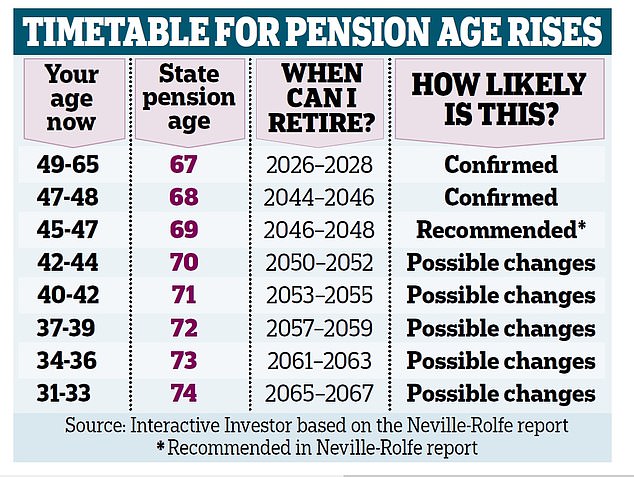<!–
<!–
<!– <!–
<!–
<!–
<!–
If there’s one lesson to take from the Waspi debacle, it’s that you can’t rely on receiving the state pension at the age your elders did.
Millions of women born in the 1950s did not know until they were approaching their 60th birthday that they would have to wait an additional six years for payment.
Such a late and crucial change in your retirement planning can leave a hole in your finances and provide you with little benefit later in life. So make sure you know well in advance when you can actually expect it.

The state pension age is reviewed by the government every few years, taking into account changes in life expectancy and the cost of generating income.
As it stands, the age at which you start receiving your state pension (currently £10,600 per year) is 66. However, between 2026 and 2028 this will increase to 67 years, meaning the retirement age for women will have increased by seven years since then. 2010.
The change will be introduced in phases, meaning there will be periods when the state pension age is 66 years and between one and eleven months. But if you were born after March 5, 1961, you are only entitled to benefits if you are at least 67 years old.
The next increase to the age of 68 was not scheduled until 2044, but last year it was rumored that the government was considering bringing it forward to 2035. That would affect everyone born between 1968 and 1979 – but the decision was postponed until after the next election.
A further increase to the age of 69 is expected between 2046 and 2048, but this has not been confirmed by officials.
It is Britain’s young people who face the bleakest wait for their hard-earned state pension. Alice Guy, of stockbroker Interactive Investor, warned that a 31-year-old today might not get a payout until he turns 74 if a previously proposed spending cap is introduced.
Workers must be given ample notice if their retirement age is increased: the government has promised to give ten years’ notice of any changes. You can check yours using the government’s official calculator at gov.uk/statepensionage. Gone are the days of one golden age of pensions, when state payments and workplace pots started paying out at the same time. Therefore, there are several milestones to consider as you retire.
You can start withdrawing money from money purchase pensions (also known as ‘defined contribution’) or personal pensions from the age of 55.
However, from April 6, 2028, savers will only have access to their pots from the age of 57. This means that anyone born on April 6, 1973 or later must wait another two years before they can withdraw their pension.
Some pension schemes have a ‘protected’ age, which means that you may still be entitled to your pension at the age of 55. Others offer in the conditions an ‘unconditional right to access your pension from the age of 55’. If you started saving in one of these pension funds before November 4, 2021, you are still entitled to your pension at the age of 55.
If you have saved in a Lifetime Isa and don’t plan to use your fund to buy a first home, you will have to wait until your 60th birthday before you can access the money.

